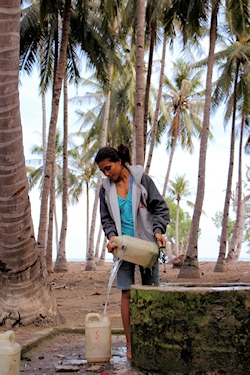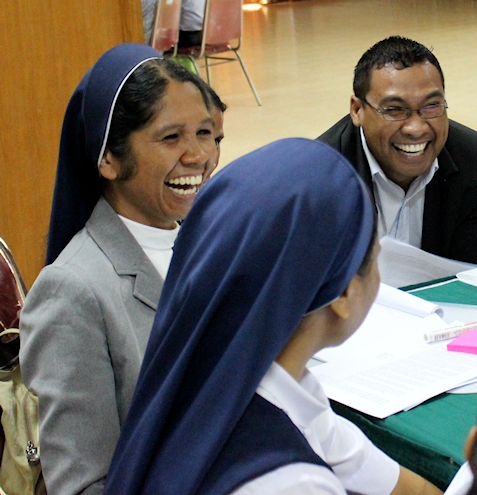Progress and Challenges in Gender Equality
Date:

A woman gathering water from a well in Timor-Leste. Gathering water is typically done by women, and is an important part of daily life, especially if guests are expected. Credit: UN Women/Betsy Davis
“Women are working almost 24 hours per day. What men do is to represent the family. For example, when you have a visitor in the house, the man sometimes acts like it is difficult for him to receive the visitor, even though the woman of the house is the one who is preparing the coffee, food and making sure the children are cleaned up and playing quietly,” said Sister Maria da Graca Maia, a member of the Holy Spirit Sisters of Salele, a convent that supports recent survivors of domestic violence. Sister Maia attended the Consultation on the Country Gender Assessment in Dili on 30 July, 2013 along with nearly 200 members of the government, development partners and civil society. The Government of Timor-Leste, in partnership with Asia Development Bank and UN Women, is conducting a Country Gender Assessment as a measuring tool for progress on equality between women and men. Factors such as women’s participation in the workforce, health, security, education, violence and justice have been examined to ascertain challenges and ways forward. The consultation workshop was held to engage a wide range of interested parties, as well as policy-makers, to ensure that the Assessment captures the main issues in each sector and to try to map the way to address these inequalities.
The Country Gender Assessment reaffirmed the findings of the Demographic Health Survey, performed by the Government of Timor-Leste in 2009-2010. This research found that women were giving birth to an average of 5.6 babies per lifetime[1], placing limitations on women and potentially increasing their economic dependence on men. “I don’t know if women are economically dependent on men. It seems to me that women are always working,” said Sister Maia to the rest of her group discussing issues of women’s security, both economic and physical. Though two-fifths of rural women are gainfully employed[2], these statistics do not take into account the household work that is generally left to women, cooking, cleaning, child care and even subsistence farming and other forms of casual work.
Issues such as the bride price were discussed in terms of how it contributed to women’s physical safety in the house, and a heated discussion followed about culture and other determining factors related to domestic violence. Recommendations were also made for pathways to reach people in rural areas with campaigns to end violence against women. “Men should be at the front of the campaign to end violence against women. Women must work with them in partnership, but it should be men showing an example for other men, and leading each other to peaceful reconciliations without violence,” said Nelinho Vital, member of the Legislation Unit at the Ministry of Justice.
As Jessica Gardner, the lead consultant for the Country Gender Assessment said, “Timor-Leste excels in certain ways, such as the high number of women in the National Parliament. There are a number of challenges ahead though, in terms of maternal health and providing economic opportunities. But this project is about more than just numbers; it is about ensuring that the investment made in producing data and research pays dividends. That the information is made available, is understood and that it contributes to ensuring policies and programmes effectively reach people in need."
Sister Maria da Graca Maia speaks out about women’s unpaid labor at the Country Gender Assessment in Timor-Leste. Nelinho Vital of the Ministry of Justice pictured to her left. Credit: UN Women/Betsy Davis
[1] Timor-Leste Demographic Health Survey, 2009-2010. Timor-Leste Demographic Health Survey. Dili: National Statistics Directorate, Government of Timor-Leste.
[2] Timor-Leste Demographic Health Survey, 2009-2010. Timor-Leste Demographic Health Survey. Dili: National Statistics Directorate, Government of Timor-Leste.
